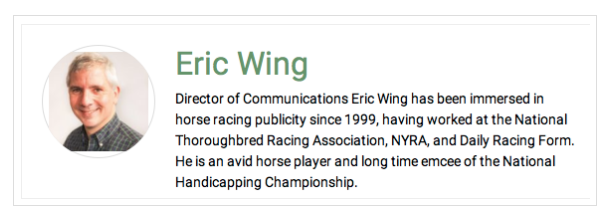
We put a lot of effort into determining which races go into each day’s featured schedule. A lot of times the best 10 or 12 races from the tracks available to us sort of jump off the page—especially on weekends when stakes races and larger fields are more plentiful.
We do, however, always have to take weather forecasts into consideration. We don’t want to use a bunch of turf races at a track if rain seems likely there.
Even worse than off-the-turf races are races at a track that has a chance of cancelling. If we lose more than 30% of the races from a featured-tourney race menu, the HorseTourneys policy is to cancel the tourney. We don’t think it’s fair to attract players with, say, a 10-race contest and then run the event with just five or six races after one of the tracks cancel. So that’s the upside of our 70% rule: Fairness. The downside is that when we cancel, we don’t make any money (and you don’t get to play). So we try to avoid such scenarios when we can.
It’s not always easy because we are making these decisions somewhere between 48 and 72 hours prior to a tournament. Cancellation worries are primarily a concern at Northeastern tracks during the winter, but on rare occasions they crop up at other times of the year—like last weekend.

A heat wave was (is?) gripping most of the nation East of the Mississippi, and with temperatures in the 90s predicted on Saturday, we were a little concerned about one or more cancellations…but not too concerned. Say what they will about the safety of their “human and equine athletes,” tracks really don’t like to cancel on their big days, and Saturday is certainly the biggest day of any track’s week.
(Astute observers will note that the term “equine athletes” is bandied about from time to time by industry executives, but only when the topic of discussion is health and safety. The rest of the time, they’re just “horses.” The same applies with jockeys. When the topic is health and safety, they’re “athletes.” The rest of the time, they’re “jockeys.” Except when they decide to stop riding due to weather or track concerns—then some track executives and trainers call them much worse.)
If last Saturday was a minor concern, Sunday was a serious concern. Predicted temperatures in the East were even higher—into the upper 90s. Los Alamitos and Gulfstream weren’t going to pose a cancellation risk, but Belmont, Monmouth and Laurel were. (It’s not often, by the way, that South Florida is the one part of the country you can reliably count on in July for reasonably cool weather.)
Never deterred by a challenge, the HorseTourneys team of meterologists (largely self-taught, a la “Dr. Bob” Harris) put their thinking caps on. After a careful calibration of predicted temperatures, heat indicies, dew points and sea breezes, they determined that Laurel was most likely to cancel, followed by Belmont, then Monmouth.
As a result, we tossed Laurel completely from our Sunday schedule (even though their races were pretty good from a contest standpoint) and only used two each from Belmont and Monmouth. The other eight would all come from Gulfstream and Los Alamitos. This way, if either Belmont or Monmouth canceled, we’d only lose two races, and the featured tourneys could go on with 10 of their 12 races (86%).
Our weather handicapping was so-so. Laurel ran its full Sunday card without a hitch. Belmont canceled its card with about five minutes to post for the first race. And Monmouth ran without incident. (Gotta love those sea breezes.) The decision to use just two races from Belmont proved to be a good one, and the “show” went on as scheduled.
It almost didn’t, though.
All of these decisions were made by early Friday morning. While driving around on Saturday morning, I had the radio tuned to the all-news station and there was a report about a pending budget impasse in the New Jersey State Legislature. If an agreement wasn’t made by midnight, all state government offices (including racetracks) would be forced to close starting on Sunday.
Around 7:00 p.m. on Saturday came word that a budget agreement was reached, and Monmouth would be allowed to race on Sunday. It’s a good thing, too, because without their two races, we ultimately would have been forced to cancel our featured tournaments.
In the future, perhaps we will pay more attention to state political news before constructing tournament race schedules. Though handicapping politicians can be even harder than handicapping the horses—or the weather.
